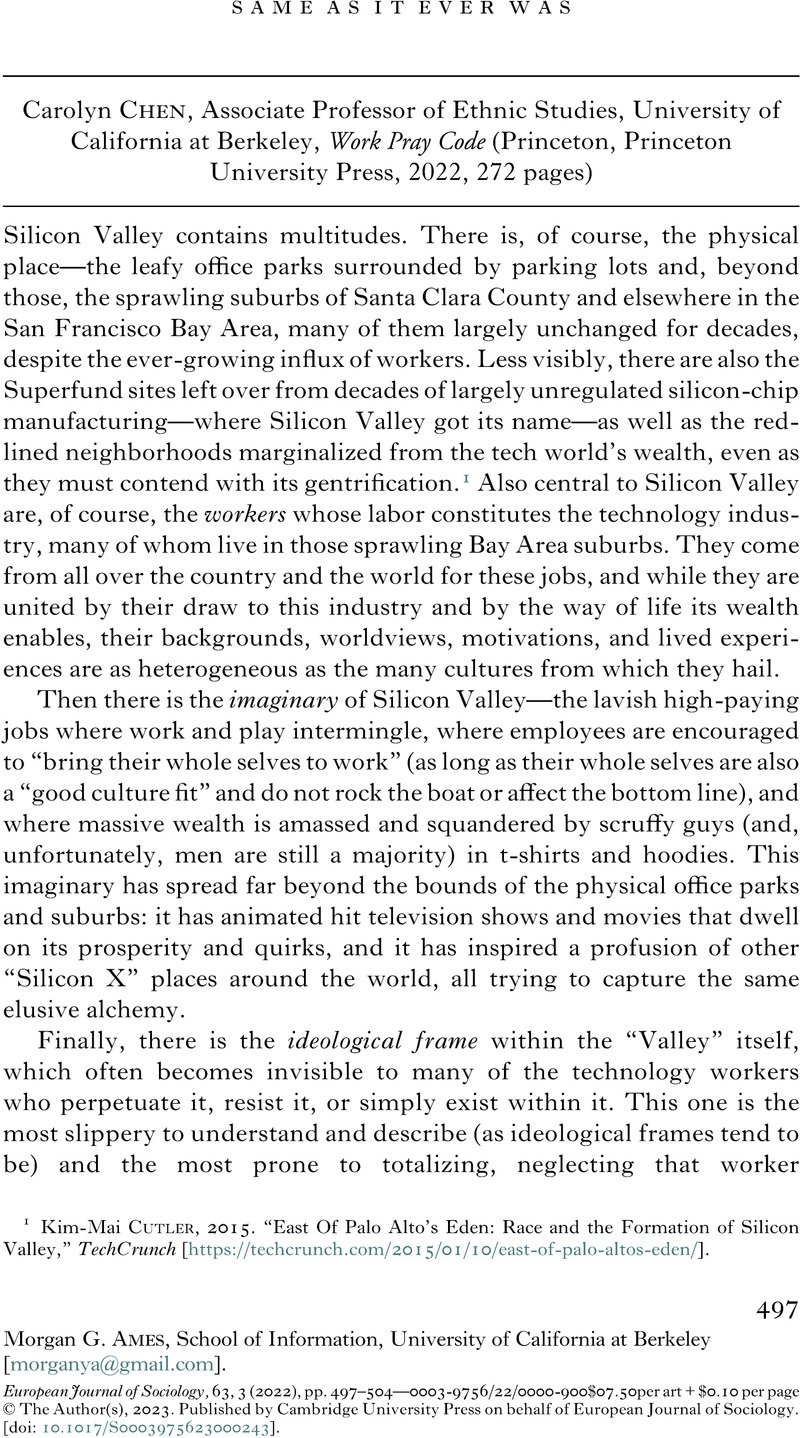No CrossRef data available.
Article contents
Same as it Ever Was - Carolyn Chen, Associate Professor of Ethnic Studies, University of California at Berkeley, Work Pray Code (Princeton, Princeton University Press, 2022, 272 pages)
Review products
Published online by Cambridge University Press: 19 April 2023
Abstract

- Type
- Book Review
- Information
- European Journal of Sociology / Archives Européennes de Sociologie , Volume 63 , Issue 3 , December 2022 , pp. 497 - 504
- Copyright
- © The Author(s), 2023. Published by Cambridge University Press on behalf of European Journal of Sociology
References
1 Kim-Mai Cutler, 2015. “East Of Palo Alto’s Eden: Race and the Formation of Silicon Valley,” TechCrunch [https://techcrunch.com/2015/01/10/east-of-palo-altos-eden/].
2 Fred Turner, 2006. From Counterculture to Cyberculture: Stewart Brand, the Whole Earth Network, and the Rise of Digital Utopianism (Chicago/Londres, University of Chicago Press).
3 Fred Turner, 2009. “Burning Man at Google: A Cultural Infrastructure for New Media Production,” New Media & Society, 11 (1-2): 73-94.
4 Fred Turner, 2016. “Technology & Counterculture from World War II to Today,” Interval Salon Talks, Long Now Foundation [https://www.youtube.com/watch?v=DCFfIaVn1tk].
5 William A. Stahl, 1999. God and the Chip: Religion and the Culture of Technology (Waterloo, Canada, Wilfred Laurier University Press).
6 Morgan G. Ames, Daniela K. Rosner and Ingrid Erickson, 2015. “Worship, Faith, and Evangelism: Religion as an Ideological Lens for Engineering Worlds,” Proceedings of CSCW 2015, ACM Conference on Computer-Supported Cooperative Work and Social Computing, ACM Press (March): 69-81.
7 Morgan G. Ames, 2019. The Charisma Machine: The Life, Death, and Legacy of One Laptop per Child (Cambridge, MIT Press).
8 Thomas Douglas, 2003. Hacker Culture (Minneapolis, Minn./London, University of Minnesota Press).
9 Steven Levy, 1984. Hackers: Heroes of the Computer Revolution (Garden City/New York, Doubleday).
10 Richard Barbrook and Andy Cameron, 1996. “The Californian Ideology,” Science as Culture, 6 (1): 44-72.
11 Vincent Mosco, 2005. The Digital Sublime: Myth, Power, and Cyberspace (Cambridge, Mass, MIT Press).
12 Gabriella Coleman, 2014. Hacker, hoaxer, whistleblower, spy: The many faces of Anonymous (London/New York, Verso books).
13 Janet Abbate, 2012. Recoding gender: Women’s changing participation in computing (Cambridge, Mass, MIT Press).
14 Nathan L. Ensmenger, 2012. The computer boys take over: Computers, programmers, and the politics of technical expertise (Cambridge, Mass, MIT Press).
15 Zoe Quinn, 2017. Crash override: How Gamergate (nearly) destroyed my life, and how we can win the fight against online hate (New York, Hachette UK).
16 Christina Dunbar-Hester, 2020. Hacking Diversity: The politics of inclusion in open technology cultures (Princeton, Princeton University Press).
17 AnnaLee Saxenian, 1994. Regional Advantage: Culture and competition in silicon valley and route 128 (Cambridge, Mass, Harvard University Press).
18 AnnaLee Saxenian, 2007. The New Argonauts: Regional advantage in a global economy (Cambridge, Mass./London, Harvard University Press).
19 Silvia M. Lindtner, 2020. Prototype Nation: China and the contested promise of innovation (Princeton, Princeton University Press).
20 Shinjoung Yeo, 2023. Behind the Search Box: Google and the Global Internet Industry (Champaign, University of Illinois press).
21 Cutler, 2015, cf. infra.
22 Sam Harnett, 2021. “Tech Workers Organizing Is Nothing New … But Them Actually Forming Unions Is.” KQED News [https://www.kqed.org/news/11874325/tech-worker-organizing-is-nothing-new-but-actually-forming-unions-is].


